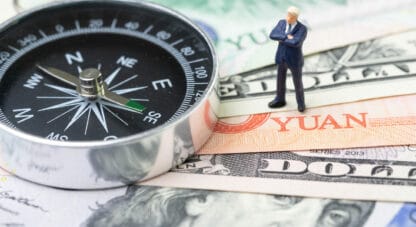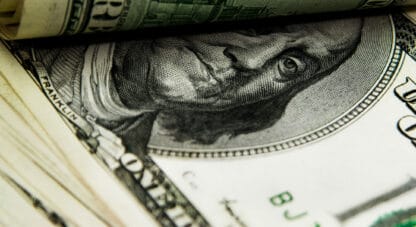The McAlvany Weekly Commentary
with David McAlvany and Kevin Orrick
“How quickly do you go from, ‘We’re okay – barely,’ if you’re an Italian, French or German bank, to ‘Oops, we’re insolvent?’ Well, do you remember Bear Stearns? Do you remember Lehman Brothers? Monday – ‘We’re okay.’ Thursday – ‘Sorry, we’re closing our doors.’ Shocking! It can happen overnight, and I think 2017 brings it to your door because of dollar strength. It’s a fascinating time to be an investor.”
– David McAlvany
Kevin: The topic of this week, Dave, has to be currency grabs, especially India. We can look at some of the things going on with currencies around the world. Zimbabwe is another one. We saw the loss of that currency completely to inflation, and now Mugabe is monkeying with trying to reintroduce his own notes. So let’s talk a little bit about that. One of the key questions right now is will Modi, who is the head of India, now clamp down on gold?
David: This is a perfect demonstration of what Reinhart was talking about when she described creating a captive audience. We did mention a number of weeks ago that the Indian government had basically taken 500 and 1000 rupee notes off the market.
Kevin: Which sound like large notes, but those are what – 7½ dollar notes, 10-dollar notes, 15-dollar notes?
David: Right, which are still high-value when you do the exchange and are buying goods in India. Things tend to be significantly cheaper there so those notes go a long way.
Kevin: Yes, but did I read this right? Is it over 80% of the currency that is actually circulated that has been taken away?
David: That’s right. You have 82% of all cash which is now out of circulation. And the government basically said, “You either deposit it directly into the banks, or” (and I’m making this date up) by next Tuesday it’s worth nothing.” And so all of a sudden people were saying to themselves, “Well, what do I do? Maybe I didn’t pay taxes on that cash. Maybe I did.” There is a number of issues which the Modi government was trying to address, bringing the black market into the light of day, but also getting control of cash and the whole financial system.
Kevin: Little did he know, he almost shut down business completely.
David: Well, if people don’t have cash, and they can’t access it in the bank that they just deposited it, in any meaningful numbers, then yes, business activity slows down. So the expectation of annual growth of 7% – it may have been moving along at a nice clip up until this decision, but basically, since the U.S. election, and since the call-in of cash in India, you’ve had a collapse in business activity across India.
Kevin: Something that is interesting, even though we here in the West have the luxury of trying to figure out whether gold is going to go up or down, and you have guys saying, “Well, I’ll buy futures on gold if it’s going to rise, or I’ll sell if it’s going to fall,” that’s a luxury. If you were in India, you would be going for gold for a completely different reason. The Indians don’t care what gold is going to do tomorrow. They just need it because their cash doesn’t work anymore.
David: That’s got to be one of the most fascinating things to witness, the way our attitude in the West is so different than an attitude someplace else in the world, driven by a very different experience. We’re not dealing with existential threat, we’re dealing with day-in and day-out market volatility, which kind of means nothing to us unless we’ve bet heavily one direction or the other. And then, of course, it might mean something to you, but not at the level of existential threat. When you’re dealing with a currency call-in, and a limited number of choices, and being immediately forced into being a captive audience, is it any surprise that you see the premium on gold to own the physical ounces in that country going up?
Kevin: Well, the market prices outside of the country have been going down somewhat. I want to bring up one other country because we know the inflation in Zimbabwe was the kind of inflation that German experienced in the early 1920s. It was the complete destruction of their currency. And so, bad money falls apart and people flow to good money. That’s just another way of expressing Gresham’s law. So Zimbabwe has been using U.S. dollars as their on-the-street currency now for years since their currency blew up.
David: We talked about there being a shortage of dollars in a number of places around the world – several countries in Africa, several countries in Asia, and the shortage of dollars is creating a bit of an issue. Again, just not able to handle daily business activity. So their solution is to offer notes which are in Zim dollars, but there is this benefit – if you’re bringing in U.S. dollars you get to buy those notes at a discount.
Kevin: Right. Mugabe was giving an extra 5% if you used his notes versus the dollar.
David: That’s right. And it’s fascinating because it assumes that there is trust in the Zimbabwe government. It assumes that there is trust in their handling and management of currency and of fixed note obligations, which is such a joke.
Kevin: Just a reminder, for those listening who would like us to answer questions on the next coming week’s Question and Answer program, just send those questions to mc******@******ny.com.
Talking about trust, Dave, what we’ve seen is this populist outcry. We saw it first with Brexit, now we’ve seen it with the election of Trump. Is this like a fascist outcry, or is it actually just another rendering of a lack of trust in the government?
David: Very frequently I’ll listen to NPR and listen to sort of liberal news media outlets and it’s fascinating to me. Sometimes, the reporting quality is excellent, and sometimes it makes me want to vomit. The treatment of sort of the Alt-Right, or what is viewed as the power structure that put Trump in office – it’s very interesting to see how the media has treated that.
Kevin: The mainstream media would make you think it’s Nazi.
David: That’s right. So reading through Foreign Affairs this week, there was an article that stood out as particularly insightful on the new wave of populism. Sheri Berman wrote it. She describes this new populism not as a danger in and of itself. That is, again, how the left-leaning pundits have painted it. They’re talking about it as the scourge of hate, misogyny – it’s just a re-branded white nationalism. That’s basically what they’re calling it – some sort of a brand of fascism reborn. Berman’s observations were totally different. She was, I think, more generous. There is a signal, she argues, in the populist movement which suggests something is wrong in our democratic institutions and political parties.
Kevin: Well, could we go for a definition here? We had Pippa Malmgren on about a year ago. She wrote a book called Signals. It’s important to understand, a signal is not a cause. A signal is a signal. It’s a way of saying something’s wrong. The signal itself is not causing it, but we need to correct it.
David: It’s an important piece of information.
Kevin: Exactly.
David: And if you can pick out that important piece of information, then there is something positive that can be done with it.
Kevin: You’re ahead of the curve.
David: Yes, and her advice is, listen to the signal. Figure out what has become noxious about politicians and political parties and address those issues. If they’re unaddressed, then, and only then, does populism threaten democracy. So again, there is this parallel to the fascist interwar period, and she says, “No, this is not it at all. We are not in that interwar period.” Frankly, I’ve got a signal coming from my hip these days. It’s a pain issue. The pain is telling me that I, in fact, have an issue. Intriguingly, as I researched it, it’s not a hip issue. It’s actually related to my pelvis, sacrum, and lower back. And the cold reality is, if I don’t address the underlying source, I could do permanent damage to my hip.
Kevin: But the hip is not the actual cause.
David: No, the solution is several steps away from the pain. And I need to listen to the signal, and I need to think about it and figure out what the real problem is and address the real problem. Because just the signal in my hip, which is the pain I’m experiencing, is actually not the real issue. Again, I think this is what Sheri is basically saying. “Look, we’re not witnessing a fascist Renaissance.” That is how the liberal media has caricatured the Alt-Right and the Trump administration. That’s the flavor of the day, if you will. But she is saying that populism is a symptom. It’s a symptom of democracy in trouble. It’s not democracy in crisis, but you can end up in crisis if you don’t address the underlying issues.
Kevin: That’s the concern that I have, Dave. I think a lot of people think the Brexit or Trump election are addressing the crisis, but actually, we need to see that as a signal and continue to analyze. Now, the mainline media, the mainstream media, right now are mainly just defending the establishment. I don’t think they’re paying attention to the signal. They’re basically just saying, “A lot of people got it wrong and look where you got us.”
David: Right. I’m trying to think of the best way to present this to my kids. This will be some dinner in the next week where we talk about argumentum ad hominem – the argument, or the attack, against the man. You don’t address the issues on the table, you don’t discuss in a logical fashion what you have a problem with that someone has put on the table propositionally. Instead you just say, “This guy is a sleaze-bag and he can’t be trusted.” Somehow, if you can undercut character or create an association to something negative, all of a sudden the message is no longer valid.
Kevin: “We don’t like that guy.”
David: And thus far the media is not encouraging reflection on the underlying issues, they are creating a reactive tone, a very defensive posture for the establishment. In essence, it’s the denial game. You have establishment politicians who should be reflecting on the surge of Trump popularity as an indication that a ton of people in the fly-over states feel like they’ve been left behind in the new century.
Kevin: And the fly-over states are, right now, all the red ones, let’s face it.
David: (laughs) Yes, that’s right. And I’m tempted to think of it in purely economic terms. But the reality is, behind the economic elements which we tend to talk about more, there is a socio-cultural shift and even a spiritual component which ends up driving individuals’ motivations. And as you are looking at policy-makers, if you’re looking at root rot, and core issues in the country, you can say, “Okay, well, it’s this person’s economic policy, that person…” No, actually, there are core motivations of greed and self-interest which have trumped statesmanship, and this has been going on for 30-40 years. I know politicians, and I know families of politicians who have personally benefitted from their family members being in office, and it makes me want to throw up, because it’s the epitome of corruption.
Kevin: Yes, their security is threatened, Dave. If your security is threatened you can boil down motivation, really, almost always to that, the security, of course, that people who are on the government dole? Of course they’re not going to be happy about the outcome of the election.
David: Right. So the fly-over states – when you have gains which have accrued to the connected, and to those who are conveniently located nearer to the slop troughs – this is where government doles have prospered, some more equally than others.
Kevin: Reminds you of Orwell, yes.
David: Right. Some pigs are more equal than others, in sort of the Animal Farm style. Here is the point of protest amongst the populace. There has been an unequal distribution of benefits, and an unequal distribution of pain. Unequal advantage and disproportionate economic pressure. So, here’s where I think the simplest explanation is often the best. I would say, it’s a money problem, which today is the same thing as a credit problem.
Kevin: Well, doesn’t it always boil down to that? As we’ve talked over the last eight years, Dave, we’ve looked at tensions rising in various countries around the world and it almost always boils down to people who are hungry, and people who are out of money.
David: I look at the left and the right in this last election and their prescriptions were radically different, but their diagnostics were almost the same. And they were missing an element. You and I talked about this, when there was the Occupy Wall Street movement I thought, “Gosh, this is an interesting energy. If it was redirected and focused, and had some basis in values, this could go a long way toward creating positive change.”
Kevin: They had no underlying solution. You know what it reminded me of? Let’s say somebody walks into a kitchen and they’re about to cook. You either have a well-ordered kitchen or you just have ingredients all over the place. They had no idea what they wanted out of this, they just wanted to protest.
David: And what I wanted to say is, “You are so close to the truth. There is something wrong with the system, and it is that there is an unequal access to credit.”
Kevin: Let me ask you a question then. You said this was a money problem, but these days money is credit.
David: That’s right. We wouldn’t be seeing democracy fray if it were not for monetary policies the past three generations of Fed presidents exaggerating the divide between – and again, if we’re going to talk about fly-over states – it’s the city folk and it’s the country folk. And this was Brexit. The city folk were shocked and amazed that there was anyone other than city folk in all the U.K.
Kevin: “These uneducated people out in the country just don’t get it.”
David: Right. But there are varieties of dysfunction. You’ve got all kinds of things that I think the populace would say, “I have a problem with this.” Political rolodexes. They get monetized when a politician leaves office. You finish public service and then monetize your rolodex. That’s not new. But like many other issues, it’s becoming more obviously disgraceful as the sums of money involved reach the stratosphere.
Kevin: You would think that in a “deflationary” environment, Dave, where the price of wheat and barley and these types of grains are about half the price they were a couple of years ago, you would think that prices would be falling for you and I, but they’re really not, are they?
David: No. Well, two things I would say. The commodities, themselves, have dropped in price, but the retail prices that people pay for finished goods, services, or the products that are tied to those commodities haven’t dropped at all.
Kevin: We’re not getting a break at all, Dave.
David: No. A loaf of bread isn’t any cheaper even though wheat is half the price it was a few years ago. Tortillas aren’t any cheaper even though corn is half the price it was a few years ago. And cattle ranchers are up against it. We’ve had the price of beef come off, but you don’t see that at the grocery store. The sums involved in everything continue to reach for the stars, and that could be a college education or a bag of groceries, because the central bank community prefers inflation. In fact, they target inflation. If you role the clock back 30-40 years and talk to a central banker in a different generation, they would have thought that is patently absurd.
Kevin: That was supposed to be their enemy.
David: That’s right. We have a singular purpose. I read an excellent 15-page interview with Otmar Issing this last week. He basically said, “Look, central banks can maintain political independence as long as they have a singular focus, and that is price stability.” If you diverge from a singular focus and move to a double mandate, you’ve compromised. You cannot be politically independent. And the power of a central bank to do good has to do with being politically independent, which is in implicit way of saying that the central bank community today, perhaps outside of the Bundesbank (laughs), has throw in the towel, and is completely politicized.
Kevin: Without going into too great a detail, Dave, the central banks really see themselves as the replacement for gold, for sound money. If you go back and actually read the writings of Ben Bernanke, he basically blames gold because it wasn’t flexible enough. And so the central banking monetary policy was supposed to be a replacement for gold to still bring some form of monetary stability, which has been the goal for millennia.
David: That’s right. “Our sound minds replace your sound money.”
Kevin: Exactly.
David: And that’s the issue that Grant likes to bring up so frequently. We’ve replaced the gold standard with a Ph.D. standard, and truly we have 700 Ph.D.s sitting at the Fed, telling us the best way, academically, to slice and dice up the economy and drive growth. And it’s just fascinating to me to see the history of the last eight to nine years written, and we’re too close to it to have any real honest critique as of yet, but I’ll be interested to see how history treats this period.
Kevin: Strangely, though, we’re too far down the track, probably, to see a vote for sound money. How in the world could politicians deal with some sort of restraint like that?
David: That’s right, because sound money runs in a parallel track with sound public policy, and it naturally presents a limiting function for politicians, having a limited budget to work with it. You’ll never find politicians who will vote for sound money because it limits their ability to operate as politicians in the modern era. They prefer access to unlimited credit. They prefer unlimited spending. They prefer unlimited lawmaking and unlimited displacement of the private sector by the public sector, which does allow for them to funnel funds to personal interests.
Kevin: And that’s not going to change, even with the Trump administration.
David: No. That is, again, the issues which populace are more and more sensitive to. Why does he say, “We want to drain the swamp?” Because people inherently know there are high levels of corruption, it’s just very whitewashed. But the only way to figure it out, as Warren Buffet says, “You only figure who’s swimming naked when the tide goes out.” And in this case, you only figure out who’s playing dirty when you drain the swamp. And there is an innate appeal to those fly-over states because they feel like it’s not as clean as it’s presented.
I think that this is a current problem with democracy, but it’s not a new problem with democracy. If you go back to Volume II of Democracy in America, I think Section 4 – this is Alexis de Tocqueville – he looks at the frailties of democracy, he writes things that echo and parallel Frederic Bastiat in his book The Law, that the law can be corrupted. It can serve interests of the few leading to a concentration of power. And that concentration of power is then sort of prettied up and presented as very good for you, in an almost pedantic way. I would say if you haven’t read Bastiat or de Tocqueville, you must.
Kevin: Do you think we’re going to see change in central banking policy, then, Dave? We have a real estate speculator in office right now.
David: (laughs)
Kevin: Now, I’m not trying to take a shot, but real estate speculation does its best work at low interest rates.
David: Yes, well, the market reappraisal of sound money and sound public policy may emerge in the context of the next administration, but it’s going to be on the heels of a lot of pain. The central bank community is maintaining a laser-like focus on disinflation, and yes, they are going to raise rates in December by 25 basis points. I think that’s a given. But they’re watching a shift toward government spending, and that will change the economic backdrop.
Kevin: That’s the fiscal element of the two-sided equation.
David: Yes, I think ultimately we see the stock market move in the direction of the bond market. I’ll get to that in just a minute. The bond market is leading, and I think stocks will shortly follow on the downside.
Kevin: But part of draining the swamp was not draining Janet Yellen out of the picture.
David: No, and eventually you have to have that accommodative Fed step back into the fray, to bail out the world from a market sell-off, because we don’t know what happens when assets sell off in a world so laden with debt. Trump’s conciliatory tone with Janet Yellen, I think, was amazing. After the election, to me, for a market practitioner, what he basically said is that you should not expect monetary conservatism from his administration. And going back to your point, that is consistent with his modus operandi as a real estate speculator. Here is the deal. He was the critic of the asset bubble which the Fed created prior to the election. But that’s prior to the election. Now it’s his bubble. He gets to deal with it, which is why, frankly, I didn’t envy either candidate in the election. But now, he owns the bubble. What is he going to do with it? He has already told you half of the equation. Deficit spending we know about. That’s coming. But new rounds of quantitative easing? That’s very possible – very possible. As you go down the track, look at 2017, 2018. We expect Europe and Japan to pass the baton back to us. We are watching global liquidity tighten.
Kevin: I think we should talk through that, because we did quantitative easing after the financial crisis in 2008, and then after we tapered back our quantitative easing, they took that on.
David: Two trillion dollars in liquidity. Sure. So that’s what annually is being provided to the market – two trillion.
Kevin: But they’re backing away now.
David: I think they will, this next year. And we’re seeing a tightening in global liquidity, even if they don’t quit putting two trillion in because an increase in the U.S. dollar has the equivalent effect of tightening global liquidity. So as the dollar continues to appreciate, you have to see that even though nobody is changing monetary policy, it is tightening liquidity in the global system. So unless there is additional liquidity added, the increase in the dollar is going to be very debilitating to your emerging markets. And I think that ultimately means that asset prices will require intervention in 2017. So going back to Janet Yellen and making sure that she doesn’t exit stage left too early, she has to be there, and be ready to sort of bail things out.
Because here is the reality. If you’re going to increase massive amounts of debt, which he has told you he is going to do, the only way that is sustainable is if you lock rates at near zero levels.
Kevin: Well, let’s go back to somebody who increased massive amounts of debt, but he had the ability to do so. There is a comparison right now with the election of Trump and the election of Reagan. What I would like to do, Dave, is, let’s walk through the context, because the context is different. Even if the intention seems the same, the context is dramatically different from 1980 to 2016/2017.
David: I think I’m safe in saying that it’s different this time, because I’d be saying it not as an excuse for thinking things won’t change – that’s usually the context in which “it’s different this time” is the kiss of death. Rather, it is to say that the context that Donald is working with is dramatically different. I’ve heard this from a number of people, Jim Grant included. And as a preview, just step back and kind of get a global picture on this. I would say that the legacy, and the seeming success of Recep Erdogan, in Turkey, for all but the last few years, it had everything to do with getting started as a politician at a secular low in the Turkish economy.
Kevin: It’s all in timing, isn’t it?
David: He came in at the bottom, which made him a very popular president for many years, as the coincidence in timing was credited to him, and to his party’s policy prescriptions. So the Justice and Development Party was cheered as the guys who had it going on, when in fact, it was more of an accident, in terms of just having come in at the right time. And the Gipper did the same thing.
Kevin: Yes, you know, there is a concept when you say, “Well, it can’t get any worse.” When somebody comes in and it really can’t get any worse, it’s going to get better. And that person is going to be known for it getting better. Reagan came in on the heels of Carter.
David: That’s right. So the parallel between the Gipper and Erdogan is that they both came in at an opportune time, near the bottom in stocks, and near the bottom in the bond market, near the top in unemployment and inflation, so things couldn’t have gotten much worse. Reagan began in 1981, and inflation was 12%. Unemployment was at 7.2%. The ten-year treasury was at 12.5%.
Kevin: Because of the inflation.
David: And public debt at 25.5% of GDP. Public debt was only 25.5% of GDP, and the S&P traded at about nine times earnings. Contrast that to today. Today, I fear that Trump is coming in at the top of the bond market, the top of the stock market, and at the outer reaches of low inflation. If the pendulum swings both ways, and we’ve been faced with disinflation and deflation for the last ten years, when and how far does the pendulum swing the other direction?
Kevin: And if there is a connection – talking about tops and bottoms – if the bond market was at its very bottom, which means interest rates were at their very top when Reagan took office, it’s 35 years. We’ve had a 35-year period where the market has shifted to where now the bond market is at the top. Interest rates – zero is about as low as you can go. So you are right, the only connection between Reagan and Trump, monetarily, is Reagan came in at the perfect time for the bond market, and Trump is coming in at the worst time for debt.
David: That’s right. Trump is coming in at the end of a 35-year bull market. Contrast, as you did, with the 1980s, yields were in nosebleed areas. Now, yields today are almost non-existent, which means that the prices of bonds in the 1980s were just bruised and battered.
Kevin: What does public debt look like today relative to GDP? You said it was 25% when Reagan took office.
David: Your two measures, if you look at the total number, it’s north of 105% of debt to GDP, and many people would say, “Yes, but the government partially owes part of that debt to itself, and so maybe it’s 75% of GDP.” Is there a difference between 25 and 75?
Kevin: But it’s three times to four times, relative to GDP, it’s either 75% of GDP or 105% of GDP. When Reagan took office it was 25% of GDP.
David: That’s right. So you have corporate debt and household debt, which today are multiples higher than in the 1980s. And that, of course, is a consequence of rates dropping to zero. And you’ve got entities which have loaded up. Entities are individuals and corporations which have loaded up on debt because with low rates, from a cash flow standpoint, of course you can have more debt. It doesn’t matter that your balance sheet is getting heavy on the debt side, because from a cash flow standpoint it’s okay because rates are low. And today, guess what? You also have the S&P trading at over 20 times earnings.
Kevin: So you have the bond market over-valued. The stock market right now – where does it compare to a 1981 stock market?
David: Right. If the S&P trades at over 20 times earnings, and it was 9, it’s slightly more over-valued today. That’s if you’re looking at normal PEs. If you prefer the Shiller PE, you’re at 27 times earnings. And there are only two or three times in recorded history that you have had greater over-valuation in the stock market. So Trump is inheriting over-valuation versus under-valuation. We are, in essence, on the other side of the 1981, 1982 step-sequence. The bond market turned first in 1981, and prices began to rise. The stock market turned second in 1982, and prices have risen in both asset classes since then, barring the shocks of 1987, 1994, 2001, 2008 (laughs), and maybe 2017 – I guess we’ll wait and see. But the bond market should lead stocks. And I think Trump will be the bag-holder.
Kevin: Unfortunately, that’s what we talked about before the election. Whoever wins is the ultimate bag-holder of a situation that existed before they got there.
David: Unless he can cozy up – and I mean really cozy up to the Fed. And when he starts cozying up to the Fed, and there is another round of quantitative easing and a response to a market decline, guess what you have?
Kevin: “Grandma Yellen, bake me some cookies.”
David: (laughs) That’s right. What are you serving with those cookies? Sour milk, if you own dollars, because I think you’re looking at the dollar trading down pretty considerably.
Kevin: If he cozies to the Fed, yes.
David: That’s right. And until then, we’re moving to crisis mode. Why are we moving to crisis mode? Because as we talked about just briefly earlier, the emerging markets are getting crushed as the dollar soars. They’re getting pushed to the walls.
Kevin: We can see the dollar rise and people will look at the gold market and they’ll say, “Oh, well, gold is down five bucks,” and they’ll look at the dollar and it’s up 50 cents. What they don’t understand is, these emerging markets have loaded up on debt, in dollars, at low interest rates, the lowest interest rates that we’ve ever seen. And now the dollar is rising, they’re having to pay it back in higher-valued currency.
David: Right. And they forget that there are two parts to the trade that they made. One was borrowing debt at low rates, and that might have made sense, but they borrowed at low rates in a foreign currency, and they’re not in control of the foreign currency exchange rate. So you’ve got Asian currencies, which were all the talk of currency manipulation – they reflect lower levels relative to the sky-rocketing dollar, far more than they reflect a determined or purposeful devaluation. The Chinese currency is down, as we mentioned. And the scariest places to be a holder of currency today, Malaysia and the Philippines, which is coming up to 50-to-1 – my parents are very sensitive to that – and perhaps India is the most scary, or most threatening. They’re nearing 70-to-1, which is an all-time low.
So I would put that at the front of the list, actually, because not only is the exchange rate threatening all-time lows, but you have Narendra Modi, as we mentioned earlier, who just took 82% of all cash out of circulation! So there is less cash in the system, he says, on his way to cashless society. And of course, we were wondering, where Rogoff’s ideas take root. The surprise is that it is two places, and they happen to be at the polar opposites if you’re talking about developmental extremes – India on the one hand, Sweden on the other. The Riksbank is looking at implementation of an e-krona and India is following the prescription from Rogoff’s book The Curse of Cash to reduce currency in circulation as a precursor to elimination altogether.
Kevin: Yes, but there is a difference between Sweden and India. You and I both know, in Sweden, they basically trust their government. In India (laughs), they don’t.
David: Right. And it’s a weird and interesting place here in the U.S. because I think the U.S. election said 50% of the populace really doesn’t trust their government, for a variety of reasons. And so there is that populist appeal, “Throw the rascals out.” But 50% are more than comfortable trusting their government, thinking that they not only had the best interest, but the best strategy was already in play. So it’s interesting. One of the great bear markets of my lifetime has been in privacy. Privacy is in its own version of a bear market in the West, in part because trust abounds between the citizen and the state, to a large degree. Maybe that’s diminishing, but it’s still at least 50% have trust in the state. And so really, privacy – who needs it? Who needs it, if you have trust in your government?
Kevin: Look at the generation below us, Dave, who are on Facebook and putting just about everything personal. They don’t see – they may not be trusting their government, but they’re trusting the people who hold Facebook, and the people who are reading Facebook, and the Internet in general. So there has been a change.
David: That generation still feels weird about Google using facial recognition technology to be able to match up photos that they’ve put up and name them publicly in other places and be able to advertise with them, individually, and personalize that advertising because of their facial recognition software. Even that generation says, “That’s a little bit weird.”
Kevin: It might be a little bit late, too.
David: (laughs) Well, I think we look at India, and it’s going to be interesting to watch the Indian government navigate their own version of a challenge to privacy. That’s what they’ve initiated there in India. Because trust is non-existent, and that trust deficiency has defined one of the critical motivations for private holding of gold in that culture for generations. At least, one of them. I think there is a cultural aspect to the love trade, as some people have called it. But I think a big one, judging by the premiums on the gold price today in India, is this issue of trust. There has been the scuttlebutt about Modi halting gold imports altogether, which is currently running around 700 tons per year, and in the West we say, “Well, then you should short gold. It’s going to be dropping $100-200 per ounce, because it’s a supply/demand issue and you just eliminated 700 tons of gold.” Again, that’s an armchair critique. It’s not a clear understanding of what’s driving the motivation of the purchaser on the other side. There is a psychological component, there is a sociological component, and there is a political component where the person doesn’t trust the government, and doesn’t trust the government’s money.
Kevin: Well, we have a historical component because they did this a few years ago, Dave, and it didn’t change the amount of flow into India. People just brought it in. You’re going to own it one way or another. It’s either going to be black market or not.
David: That’s right. So we doubt that that is going to happen. We doubt that there will be an elimination of imports.
Kevin: But if it does happen, Dave, do you think there is some sort of way a person could profit from that?
David: I think the easiest trade of 2017 sees India stop the official import of 700 tons of gold. The easiest business opportunity, if you wanted to make 1000% on your money – this is a no-brainer – mule trains through Pakistan.
Kevin: So you just basically buy a pack animal in Pakistan.
David: (laughs) Renting beasts of burden to accommodate market demand for precious metals, because 700 tons is still going to find its way into India, officially or unofficially. And this is the madness of Rogoff. Rogoff and Modi presume too much about the compliance of people when survival is on the line. You have traders in the first world who have sold gold in expectations of restricted imports into India, and Indians, themselves, have bid up the price, and are willing to pay higher premiums, due to the currency tinkering, and the possible threat of limited access to precious metals, and by the way, the already limited access to the funds which they were forced to put into the banks. “Put all of your money into the bank before it’s worthless. By the way, you can only take out a pittance on a daily basis.”
Kevin: That’s the difference between a speculator who has the luxury of being able to do that from the outside, and a person who is literally just trying to survive.
David: That’s right. So traders in the U.S. are now more bearish on gold than they were at the December 3rd lows when it priced out at $1046.
Kevin: So it’s lower right now. There are more bears on gold than there were a year ago when gold was below $1050.
David: Another way of saying that is that the bullish crowd has diminished to just a few people left.
Kevin: You’re one of them. I think you’re still bullish, aren’t you, Dave?
David: I love it when gold gets cheaper.
Kevin: You’re an idiot, you’re crazy. You’re just like your dad, just like me.
David: I may be. We may be. And so, there is this issue – sentiment runs to the extremes before it reverses, and daily sentiment for silver reached a high of 97%. Steven Hochberg follows these things very well – 97% bullish. That was late June, early July of this year. 97% bullish means there is like 3% left – imagine 100 people in a room. When you run out of buyers, and the last person has bought, you don’t have any more buyers.
Kevin: It probably would have been a good day to maybe sell some silver contracts.
David: On a short-term basis – absolutely. So it signaled a correction. Well, that number sits at 6% today – 6% bullish.
Kevin: Okay, so 100 people in the room, six people raise their hands when somebody says, “Are you still buying silver?”
David: Ninety-four people have said, “I just sold mine, you’re the idiot still holding.” And again, you run out of sellers, and guess what the market does?
Kevin: It reverses.
David: Right. So actually, silver, this daily sentiment index, is more bearish for gold and silver today than it was in December. The December lows for silver were 10% bullish versus 6% today. And silver, of course, was trading at like $13.50, $13.70, somewhere in between. And how do we translate this? There is a major rally which is immediately around the corner.
Kevin: All joking aside – all joking aside – when you have those numbers at such extremes, you always have a reversal.
David: (laughs) Always, except this time.
Kevin: Right. This time it’s different.
David: There is always the possibility that something crazy happens, but I think, yes, the majority of the time it begins to soar off of those levels, or fall off of those levels, between extreme bullish and no bulls at all.
Kevin: Okay, so we’ve talked about the metals, but I want to go back to this emerging market thing just for a moment, because the level of pain that could be caused – let’s say you’re in Turkey right now.
David: This is why 2017 is one of those fascinating years to step into. Not only do we have a new administration in the United States, with every leader in the free world shaking in their boots because they’re not sure what the implications are.
Kevin: Including Erdogan.
David: Well, sure. What does this mean for anyone on the planet? And as the dollar continues to go higher – if we go back to Erdogan for a moment, two things stand out in terms of the European economic and currency stability, because what happens in Turkey doesn’t stay in Turkey. What happens in Turkey has a direct impact on Europe, and on the world. And just as we talked about the rise in the dollar, it has forced up the cost of repaying dollar-denominated debt. Yes, that’s true in Asian countries. But there is about a 270 billion dollar exposure to Turkish debt that is concentrated in European banks. And that debt is dollar-denominated.
Kevin: So that’s just in European banks – 270 billion – that’s huge, but the total debt exposure is actually quite a bit larger in dollars, is it not?
David: That’s right. And I love Napier’s research – Russell Napier – he’s going to join us again on a Commentary in January, I believe. One of the things that he has pointed out recently is, this is the killer. You have folks who have this huge stock of debt, and it’s not in local currency terms, it’s in foreign currency terms. And to the degree that you see appreciation in the denominated currency of that debt, or devaluation in the currency, the home currency which has to pay back the money – it’s like testing your flexibility. I can tell you, I cannot do the splits, but the Turks are getting ready to practice this splits. And this is what it looks like – 400 billion dollars in debt has essentially become – since the election – 476 billion dollars, effectively, because of the currency exchange differential.
Kevin: 76 billion dollars is a lot of money in the United States, but in Turkey that’s almost devastating.
David: So a 19% change in the currency effectively raises the burden of debt by that amount – 400 billion becomes 476 billion. At what point does Erdogan say, “Sorry, can’t do this. It’s too much of a burden to bear.” This is why I say 2017 is going to be absolutely fascinating, because as we march toward a higher dollar, oh sure, there is the knee-jerk response and gold sells off. That will fix itself halfway through 2017 and I think you’ll see significantly higher gold prices, because as you may recall from the 1970s, there is not always a connection between the move in the dollar and the move in gold. The dollar declined, declined, declined, and by 1976 stabilized, and didn’t go down anymore, and that did not put an end to the bull market in gold. In fact, the dollar stabilized and gold, then, more than doubled in price, after the dollar stabilized.
My point is this. We are in the midst of triggering the kinds of financial crises which up-ended the world in 1998. Malaysia was the last significant currency collapse where to stop the bleeding they brought in capital controls, to stop the bleeding they shut down all payments of debt.
Kevin: It was called the Asian Contagion, and it was started by the same type of thing we’re talking about now. It was started by a rally in the currency that the debt was denominated in.
David: That’s right. So a dollar strength theme is one of the things that ends up undoing the global economy. And quite frankly, when you go back to this 400 billion, now effectively 476 billion, in Turkish debt that is owed, 270 billion of that is in banks, with the majority of the 270 billion being in European banks. A default or an announcement from Erdogan that says, “We’re done, we’re not paying,” is a day of insolvency. How quickly do you go from, “We’re okay, barely,” if you’re an Italian, French or German bank, to “Oops, we’re insolvent?” Well, do you remember Bear Stearns? Do you remember Lehman Brothers? Monday, “We’re okay.” Thursday, “Sorry, we’re closing our doors.” Shocking! It can happen overnight, and I think 2017 brings it to your door because of dollar strength. It’s a fascinating time to be an investor.
















